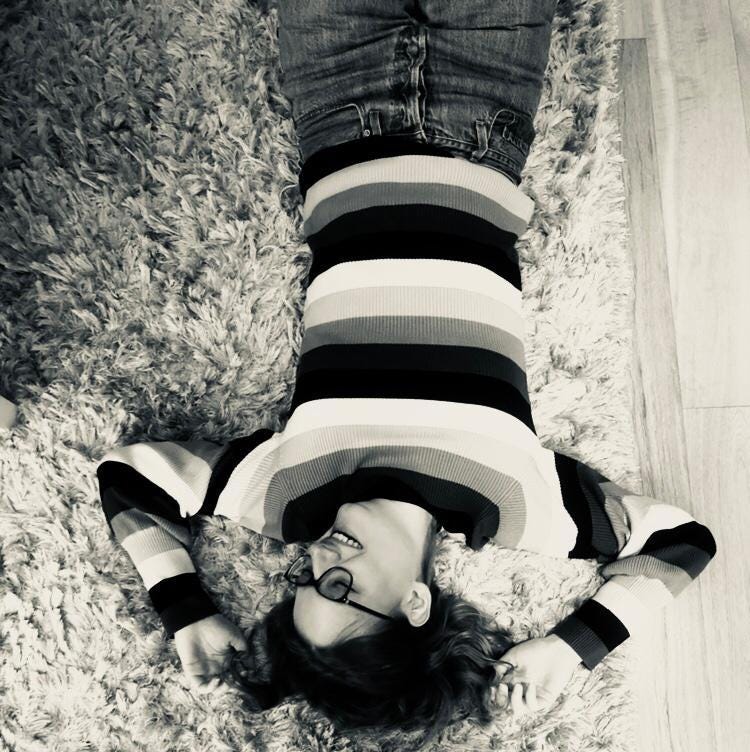The perils of imagining a perfect life
I’ve been postponing life & how I’m trying to start living
(This is an audio version of this letter, recorded by me, imperfectly and without editing. I hope you enjoy listening.)
Hello, I’m Philippine and to be honest, I feel like a beginner at life – I am forever trying to make sense of it. You can find my attempts at this, plus reflections, musings and experiences right here, in my newsletter. Subscribing is free! For everyone who feels like a beginner at life, and wants to connect in some way.
One of my favourite and go-to activities is daydreaming about my life and future. It happens automatically, all the time, whilst walking, showering, cooking, and so on, and I love it. I’ve done this for pretty much my entire life (although my fantasies didn’t start out the most ambitious: when I was about two years old I wanted to be a dustwoman, together with my mum of course).
Later I fantasised about being a star at small talk, sending birthday cards religiously, becoming a successful actor, and more. And so my imaginings grew exponentially and spread to every possible domain of life as time went on, they became more and more detailed, and perhaps most noteworthy, they were and are perfect.
I don’t think I realised the downside of this until recently, since it didn’t seem to matter that this imagined life was perfect – and thus impossible – precisely because it’s merely that, imagined. Not to mention the fact that I actually enjoy daydreaming in this way. It’s a fun way to spend my time, and it’s comforting to think that my life could one day be what is only in my head for now… Ha, and there we have the issue, ‘that my life could one day be’. I don’t think so, perfection is impossible. And although I already knew this, imagining a perfect future makes it seem – feel – possible nevertheless.
It’s an escape in some ways, which in itself isn’t necessarily harmful, as long as I spend enough time in the real world too. The thing is, though, that the world of my escape puts my actual world in a dim light. It’s hard to keep the two – real life and imagined future – truly separate, because both concern the same thing – my life. Therefore they can’t be distinguished in the same way that, for example, your own life and the world of a book you're reading can.
As a result, the escape takes away both my attention from my current life, and compares my present to a perfectly imagined future, making it harder if not impossible to enjoy my real life in this moment – you know, the one that I’m actually living.
But what if there isn’t much to enjoy about real life? For more than four years now I’ve been coping with lots of fatigue because of burnout and long Covid. During those years my life sucked pretty badly a lot of the time, making the fantasy all the more alluring. And the longer I couldn’t live that imagined life, the more time I had to perfect it in my imagination, growing both in magnificence and size.
But is it really because of my illness that I can’t live that life? Of course not (okay, a little bit – or a lot – maybe), it’s mostly because that moment at which everything will work out and come together, when all the work will finally be rewarded, will never arrive. Or perhaps it will, but I won’t notice it because I’ll be too busy fantasising about and striving for an even more perfect future moment.
This is not what will get me out of this illness, it’s what drove me there in the first place. And now I am falling in the same trap as I did then, when I was always working way too hard for school and uni, not because I liked it, but because I believed that it would get me to the place where I would be able to do what I actually wanted.
Ironically, getting lost in such a future fantasy makes you do the very things (like working too hard) the elimination of which is part of what makes the daydream so appealing, all under the impression that doing them now will facilitate the imagined life to become real one day. In reality, of course, this does the exact opposite.
Working too hard now so that later you don’t have to work at all, instead of simply working the right amount the whole time – it’s kind of insane. I mean you would never consider spending half of your life doing nothing but annoying little things such as brushing your teeth, loading the dishwasher, queueing at the supermarket, and the like, to then never have to do it again the remaining half of your life or however long it would be. It makes no sense, it’s not how humans work. Plus, that part of life where you just get to enjoy it, will never come. For life is always fifty/fifty anyway and perfection simply cannot be reached – at the very least it cannot be maintained.
It’s the classic ‘when I… I’ll be happy’ fallacy. When I’m done with all my homework, when I graduate, when I’m thin, when I finally have the knowledge about all of the cool things, and so on and on. During my illness this sentiment has largely ruled my world. I wasn’t depressed – thank god, although naturally I felt down a lot of the time – meaning that I still wanted to do many things, but I was so so burnt out with an extra portion of fatigue on top thanks to a lovely thing called long Covid, that I was unable to do any of them. And so they all became future ‘when I…’, and of course then I’d be happy.
And because I had so little control over my recovery, I think I unconsciously started to direct that need for control at the vision of my future life, perfecting it endlessly. However, this wasn’t merely about gaining some sense of power, it was also a way for me to occupy myself with something positive, to cultivate feelings of hope and excitement – light at the end of the tunnel. If only I could imagine it, then surely it would become real one day.
For a while this energy focused itself primarily on appearance and everything else external. I started to research what kind of colours looked good with which skin undertone, where I could buy sustainable clothes that I liked, I watched makeup tutorials (even though I hardly ever wore mascara, let alone anything more), and so on. Yet I wouldn’t consider myself a very appearance-centred person at all.
Sure, I enjoy beautiful things and I like putting on nice clothes, and some of that did play a role. To a certain extent there was a genuine need to feel good in how I looked again after so many years of a pale face with permanent bags under my eyes, incapable of going to the hairdresser, and too sensitive to wear anything but jogging bottoms. But I think that all of this was mostly rooted in something else.
It was like a last resort, making myself believe that all of these external things would somehow turn inward and transform me, making me feel alive, vibrant and energetic – recovered.
Part of the issue, then, may seem (and to some extent perhaps is) the focus on the external instead of the internal stuff. Appearance and achievement over mindset and meaning. Nevertheless, I think it’s more complex, as the emphasis on perfecting the internal is subject to the same issues.
I’ve been there, and I still regularly am. It feels fun to imagine myself with all the mental and emotional habits I aspire to. Moreover, it feels comfortable and easy, because as long as I’m merely imagining it, I don’t have to actually do it. Yet imagining myself perfect when it comes to psychological stuff, makes my current internal state seem simply not good enough. And to take it up a notch: that feeling of inadequacy itself becomes something to criticise, and so on to infinity.
Of course this doesn’t mean I think striving, improving and growing is bad by definition. In fact, I like occupying myself with this sort of thing, and I don’t want to fall to the other extreme. The challenge, then, is in finding a way to combine on the one hand accepting and enjoying the imperfect present, and on the other hand striving for some kind of improvement.
However, when I talked to my autism coach about this recently, he very aptly made me realise that it’s easy to fall into the trap of treating this middle way as another kind of perfect point to strive for and be reached… Oh yes, the traps and temptations are everywhere.
Consequently, in some ways it is about turning towards the internal work (first), as opposed to the external stuff. Since the prerequisite for all of this is the cultivation of a certain kind of attitude. Practising a helpful narrative is vital to be able to either avoid falling into the trap of the perfect vision, or, more realistically, to catch yourself when you do fall – to become aware, notice that it’s happened, and restore the balance. Of course a permanent equilibrium is impossible, instead it’s all about being able to restore the balance when needed. Not finding, but seeking balance as a continuous process without endpoint.
It is essential, clearly, to face our and life’s limitations. I can’t have the ideal routine and use of my time, have everything organised down to the last detail, maintain flawless relationships, look impeccable, keep my house spotless, deal with my emotions in the most healthy way, etc. But unconsciously believing that I can is making me wait to start living. Conversely however, I need a future vision to feel like my life is worth living.
This is where something very wise I heard recently comes in. On The Mel Robbins Podcast guest and happiness expert Dr. Tal Ben-Shahar speaks of the combination of being present and having purpose. Basically the reconciliation of these two models of happiness (mindfulness and striving towards goals) is key – it’s not either or, but both. However, it’s not about achieving goals, but about having them. In fact, having a purpose enables you to enjoy the present.
Of course! I can feel that this is true, a sense of direction makes all the difference. It’s easy to know this, because the lack of it – aimlessness – feels so dreadful. Yet the opposite, mere striving and missing your own life while it’s happening as a result, is just as bad.
And so, instead of using the present instrumentally to reach your goal, funnily enough, it is reversed, and having a goal becomes a means to enjoy the moment. It seems so obvious now, but what a revelation. My focus needs to be on having a purpose, and enjoying the present because of that, instead of imagining a perfect life and thus postponing meaning, enjoyment and life itself.
Now of course it’s unrealistic, and I’d say even undesirable, to be enjoying the present 100% of the time, living every day as if it’s your last. This would very quickly turn into a horribly chaotic situation that would actually cancel out the enjoyment.
If you don’t do your washing and don’t go to work (because why would you if it’s your last day), for example, there’ll be a point when you run out of clean clothes and out of money to buy some more. You’d have to wear smelly clothes, won’t even be able to buy food, and you’d have to start begging…
Okay enough of that silly scenario – all just to say that there is some faulty logic at the root of this whole idea of living every day as if it’s your last. Not to mention the fact that you sometimes simply do feel crappy, and if on top of that you start beating yourself up for not enjoying the present, it only gets worse.
So, yes, we do need both the enjoyment of the present and a sense of purpose. ‘Present because of purpose’ may have to become my new mantra. But again, that too can’t be executed or applied perfectly. It’s all about becoming aware of any traps you might be falling into, again and again and again.
I’m going to try to do this, to catch myself when revelling in a perfect future vision. I’ll try to let go of the details and extract from it what truly matters to me, taking a sense of purpose or direction from that. This will hopefully allow me to enjoy my life as it is right now – at least some of the time. And every now and again, before I catch myself, I may secretly enjoy this daydreaming, just for a bit. Don’t tell anyone I said that, though – shh.
How do you deal with this fun yet dangerous tendency to fantasise about a perfect future?
Welcome to Beginner at Life
There’s so much I want to tell you. I want to tell you about my burnout, my long Covid, the hell it’s been and the ways in which I’ve grown. I want to tell you about my autism and the new chapter of my life I’m entering, of rediscovering myself and rediscovering life. I’ve been wanting to tell you for a long time, but I thought it wasn’t the right time yet. I wanted to make everything in order so I could fully focus on it. And in a way, that would be wonderful, but I don’t think I’m able to wait.
I actually like overthinking
I think my way through life, it’s my way of being, of relating to life, trying to make sense of it. Sometimes, however, this takes a turn for the worse – or so I’ve viewed it until recently anyway.






I really relate to this Philippine! The 'when this thing happens, I'll be happy'. And what I notice is, I have the thing/am doing the thing and then the goal posts shift - I focus on something else I need to have or do. I really like this idea of mindfulness AND purpose - that really resonates with me. Thank you for sharing.